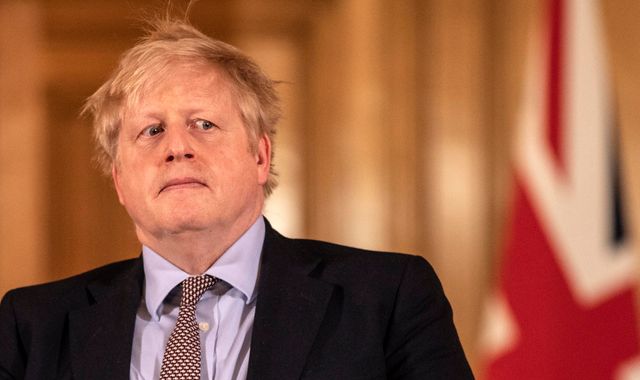Coronavirus: ‘We have to go further’ – PM tells Britons to avoid pubs, restaurants and non-essential travel
Written by News on 17/03/2020
Boris Johnson has told Britons to avoid pubs, clubs, restaurants and theatres and to only make essential journeys in the “national fightback” against coronavirus.


The prime minister told a Downing Street news conference the number of coronavirus cases in the UK could now double every five or six days without “drastic action”.
“Today, we need to go further,” Mr Johnson said, as he explained how the country now appeared to be approaching a “fast growth” period in the spread of COVID-19 – the prevalent strain of coronavirus.
Anyone with a high temperature or a persistent cough who lives alone is continuing to be told to self-isolate for seven days.
However, in new advice issued on Monday, entire families – or households of more than one person – are being told to stay isolated together for 14 days if one of them displays either of those symptoms.
“That means that if possible you should not go out, even to buy food or essentials, other than for exercise and in that case at a safe distance from others,” Mr Johnson said.
And, in advice for all Britons – even if they are not displaying symptoms – the prime minister added: “Now is the time for everyone to stop non-essential contact and to stop all non-essential travel.”
People should start working from home “where they possibly can” and “should avoid pubs, clubs, theatres and other such social venues”.
What is the latest coronavirus advice?
- If you live alone and have a high temperature or a new and continuous cough, you should self-isolate for seven days
- If you live in a household with others and have a high temperature or a new and continuous cough, both yourself and all others in your household should stay isolated together for 14 days
- Everyone, including if you are not displaying symptoms yourself and live in a household where no one is displaying symptoms, should stop all unnecessary contact with others and all unnecessary travel
- You should work from home where possible and avoid venues such as pubs, clubs, theatres and restaurants
- Pay particular attention to the advice if you are over 70, pregnant, have underlying health problems or live in London
- Don’t call the NHS 111 helpline if you have mild or moderate illness and instead seek advice online. But do call if your illness becomes more severe.
As of 9am on Monday, the number of coronavirus cases in the UK has risen to 1,543 – an increase of 171 in 24 hours.
A rise of 19 deaths in a 24-hour period also means a total of 55 people in the UK diagnosed with COVID-19 have now died.
England’s chief medical officer Professor Chris Whitty said measures to tackle the spread of coronavirus in the UK would need to be in place for a “prolonged period”, during what would be an “extraordinarily difficult” time for hospitals.
He said: “People should be thinking of a minimum of weeks to months and, depending how it goes, it may be longer.
“It’s really important people realise they are in for the long haul on this.
“But this is really important, if we are to defend the ability of the NHS to treat people, if we are actually to minimise mortality, we have got to see this as a long game.”
Prof Whitty urged people not to call the NHS 111 helpline if they have mild or moderate illness, in order to preserve the service for those most in need.
Sir Patrick Vallance, the government’s chief scientific adviser, predicted the fresh measures would have a “big effect”.
He said: “This is not a series of small interventions. You would anticipate that this could have a dramatic effect to reduce the peak and to reduce death rates.
“They are not easy but they are important and they will have the effect if we all do it.
“This is a matter for us to take accountability to make sure we help each other, protect ourselves and protect the NHS.”
In other measures that will come into force from Tuesday, the government will no longer be allowing emergency workers to support mass gatherings, which will likely lead to many more cancellations of concerts and sports events.
The prime minister also confirmed measures would be escalated once again in the coming days, when those with underlying health problems would be told to isolate themselves for three months.
“By this coming weekend it will be necessary to go further and to ensure that those with the most serious health conditions are largely shielded from social contact for around 12 weeks,” he said.
“We want to ensure that this period of shielding, this period of maximum protection, coincides with the peak of the disease and it is now clear that the peak of the epidemic is coming faster in some parts of the country than in others.”
He told Londoners to pay particular attention to government advice on home working and avoiding “confined spaces” such as pubs and restaurants, as the spread of the virus in the capital was “a few weeks ahead” of other parts of the country.
Advice on avoiding all social contact was “particularly important” for those aged over 70, pregnant women and those with some health conditions, Mr Johnson said.
He added “unnecessary” visits to friends and relatives in care homes should cease.
The prime minister said the measures were “worth it” to enable the NHS to cope with COVID-19.
Sir Patrick said the UK was around three weeks behind Italy, which has been put into lockdown, in terms of the spread of coronavirus.
He said: “It looks like we’re on the fast upswing or just about to get there and that’s the reason to want to get in quite quickly with these measures.”
The government is now going to be holding daily televised news conferences concerning the coronavirus pandemic.
The briefings – given by the prime minister or another “senior” minister – follow criticism over an apparent lack of transparency about the government’s efforts to protect the public from COVID-19.
Earlier on Monday, as his government battles to deal with the impact of the coronavirus pandemic, the prime minister held talks with Chancellor Rishi Sunak and new Bank of England Governor Andrew Bailey.
Mr Johnson later took part in a phone call with G7 leaders to discuss the international response to COVID-19.
In a statement, world leaders said they are “committed to doing whatever is necessary to ensure a strong global response through closer co-operation and enhanced co-ordination of our efforts”.
The prime minister was also due to speak to British manufacturers about ramping up the production of vital medical equipment.
Health Secretary Matt Hancock has admitted the UK is likely to need “many more times” the 5,000 ventilators that the NHS currently has.
The government is also continuing its dialogue with supermarkets about ensuring the continuation of supplies, while also talking to education chiefs about the possibility of school closures.
In fresh guidance, ministers have said children who develop a continuous cough or fever at school should be sent home with suspected coronavirus.
A government bill on emergency powers to deal with the coronavirus outbreak is to be set out on Tuesday and published on Thursday.
(c) Sky News 2020: Coronavirus: ‘We have to go further’ – PM tells Britons to avoid pubs, restaurants and non-essential travel







